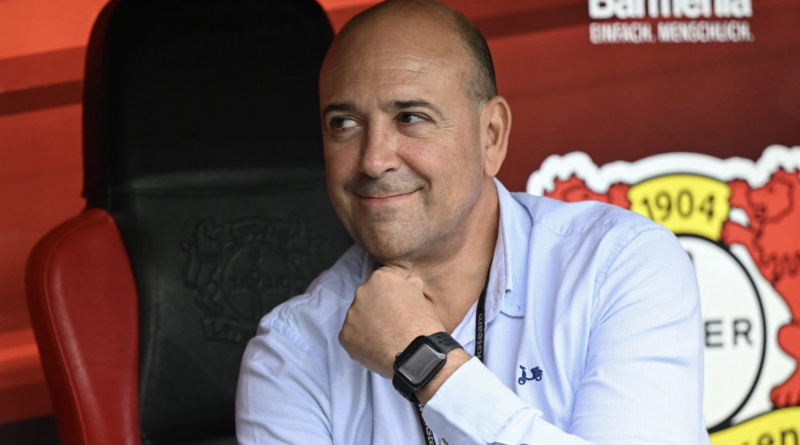Bayer Leverkusen CEO Fernando Carro reveals how he led the team to an undefeated season. ‘A football club has to be managed much like a business’
Even though it took him 24 years, Bayer Leverkusen CEO Fernando Carro always wanted to be a sports executive.
Carro, 60, a Spaniard by birth but a German by adoption, was an executive at the Gütersloh-based media giant Bertlesmann, controlled by the billionaire Mohn family. There, he rose the ranks rather quickly by his telling. Carro said he was placed into a management role just five months into his tenure before eventually departing for his dream job as the CEO of a professional soccer team.
“I always had the objective to end up in sports,” Carro told Fortune in an interview at the New York office of the Bundesliga, Germany’s soccer league. “Head hunters were offering me jobs all the time, and I was telling them, ‘No, I’m only interested in sports.’ [Then] they were looking for the CEO of Bayer Leverkusen. And I said, ‘This, I’m interested.’”
Carro’s time as CEO of Bayer Leverkusen, which is wholly owned by the pharmaceutical giant Bayer, has been nothing short of the most successful period in the club’s history. Last season Bayer Leverkusen won its first-ever league title—a momentous occasion for a club that was always a bridesmaid but never a bride. Just as important as the win itself was how it happened. Bayer Leverkusen dethroned Germany’s perennial champions Bayern Munich that had won the league 11 years in a row. And they did it without losing a game, going undefeated over 34 games.
Bayer Leverkusen fans had a long history of coming within inches of glory only to fall short. It finished as Bundesliga runners up five times without ever taking home a winners medal. In 2002, it suffered the ignominious distinction of coming in second in the German league, the German cup, and the Champions League final (Europe’s top club competition). That meant three silver medals in the span of 11 days.
That reputation earned Bayer Leverkusen the unflattering sobriquet Bayer Neverkusen—which explains itself.
Despite the club’s newfound success, Carro is sanguine about where it belongs in the pecking order of European soccer.
“The top 10 is difficult, even if sporting-wise, we could achieve it, [we couldn’t] on the branding, or on the importance for a player,” Carro said.
The world’s biggest clubs like Bayern Munich, Spanish juggernauts Real Madrid and Barcelona, Manchester City in England, or Paris Saint-Germain in the French capital will always have a level of global appeal for players, fans, and sponsors that remains virtually unattainable.
In 2023, Bayer Leverkusen made $58 million dollars, a fraction of what the clubs at the pinnacle of European soccer earn. For example, that same year Manchester City earned $898 million dollars, more than 15 times what Bayer Leverkusen made. Real Madrid’s revenues topped $1 billion.
When Carro took over the top job in 2018 he leaned on his corporate experience from Bertelsmann. In his most recent role there he had overseen 70,000 employees as CEO of its subsidiary, logistics company Arvato.
“I’m convinced that a football club has to be managed much like a business, because you need a long term vision,” Carro said. “You need a strategy, independently of the short term influences that you have. You need to have a long term plan.”
One of the first things Carro did was change personnel.
“I always look at the leadership team,“ Carro said. “It’s very unusual that I don’t change things. I sometimes change one, two, three people.”
Carro said he shook up the marketing, sales, and communications department in his early days. According to Carro, the “best and most important decision,” he made was appointing Simon Rolfes as the sporting director, the equivalent of a general manager in American sports. Rolfes would go on to build the title-winning team, recruiting little-known players from across the world, and in 2022 hiring legendary Spanish midfielder Xabi Alonso as coach. Carro knew that even though he was an experienced manager, he needed a soccer expert to handle on-field matters.
“The sporting part is key. So I knew that with my background, I needed someone to be a good tandem with me in making decisions that sporting-wise make sense,” he said. “At the end of the day, sports and football is a people business, therefore the people that you have are key.”
Just as Carro revamped Bayer Leverkusen, he also sees an opportunity to reform the German soccer system, which he considers outdated and lagging behind the Spanish and English leagues. In Germany, clubs are limited by what is called the 50+1 rule, which says that no matter the size of an investor’s stake the voting majority must always remain with the fans. Bayer Leverkusen is exempt from the rule because it is entirely owned by Bayer. Still, Carro has made no secret of his dislike for the rule.
“It hinders you in bringing in new resources, because people, if they put money into a club they want to have a say,” he said. “Why should they put money in if they cannot have a say?”
The institutional investors that have flooded to European soccer—sovereign wealth funds from the Gulf and American private equity—find the rule off-putting because they’re wary of not being able to control their investments. Though, that hasn’t stopped some from investing. The Miami-based private equity firm and major sports investor 777 Partners bought a 64% stake in Hertha Berlin in March 2023.
German fans have a reputation for being staunchly opposed to institutional investors. The Bundesliga had to cancel a $1 billion deal to sell up to 8% of its media rights to external investors after a fan revolt that included remote controlled cars storming the field.
Private equity firms can help take clubs forward by encouraging them to think differently, according to Carro. However, any investment from private equity remains purely hypothetical, and therefore far from Carro’s mind.
“I am not thinking about this because it is something that is not possible,” he said. “So I’m not thinking about something that would not be possible.”



